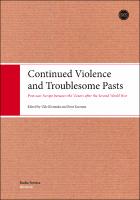Continued Violence and Troublesome Pasts: Post-war Europe between the Victors after the Second World War
Contributor(s)
Kivimäki, Ville (editor)
Karonen, Petri (editor)
Language
EnglishAbstract
In most European countries, the horrific legacy of 1939–45 has made it quite difficult to remember the war with much glory. Despite the Anglo-American memory narrative of saving democracy from totalitarianism and the Soviet epic of the Great Patriotic War, the fundamental experience of war for so many Europeans was that of immense personal losses and often meaningless hardships. The anthology at hand focuses on these histories between the victors: on the cases of Hungary, Estonia, Poland, Austria, Finland, and Germany and on the respective, often gendered experiences of defeat. The book’s chapters underline the asynchronous transition to peace in individual experiences, when compared to the smooth timelines of national and international historiographies. Furthermore, it is important to note that instead of a linear chronology, both personal and collective histories tend to return back to the moments of violence and loss, thus forming continuous cycles of remembrance and forgetting. Several of the authors also pay specific attention to the constructed and contested nature of national histories in these cycles. The role of these ‘in-between’ countries – and even more their peoples’ multifaceted experiences – will add to the widening European history of the aftermath, thereby challenging the conventional dichotomies and periodisations. In the aftermath of the seventieth anniversary of 1945, it is still too early to regard the post-war period as mere history, the memory politics and rhetoric of the Second World War and its aftermath are again being used and abused to serve contemporary power politics in Europe
Keywords
second world war; violence; postwar period; sex crimes; europe; Finland; Germany; Nazism; Rape; Red Army; Soviet UnionDOI
10.21435/sfh.22ISBN
9789522229045;9789522229038OCN
1030816117Publisher
Finnish Literature Society / SKSPublication date and place
Helsinki, Finland, 2017Series
Studia Fennica Historica, 22Classification
History and Archaeology
Later 20th century c 1950 to c 1999
Second World War
Modern warfare
c 1938 to c 1946 (World War Two period)
Society and Social Sciences
Violence and abuse in society
Sexual abuse and harassment


 Download
Download Web Shop
Web Shop